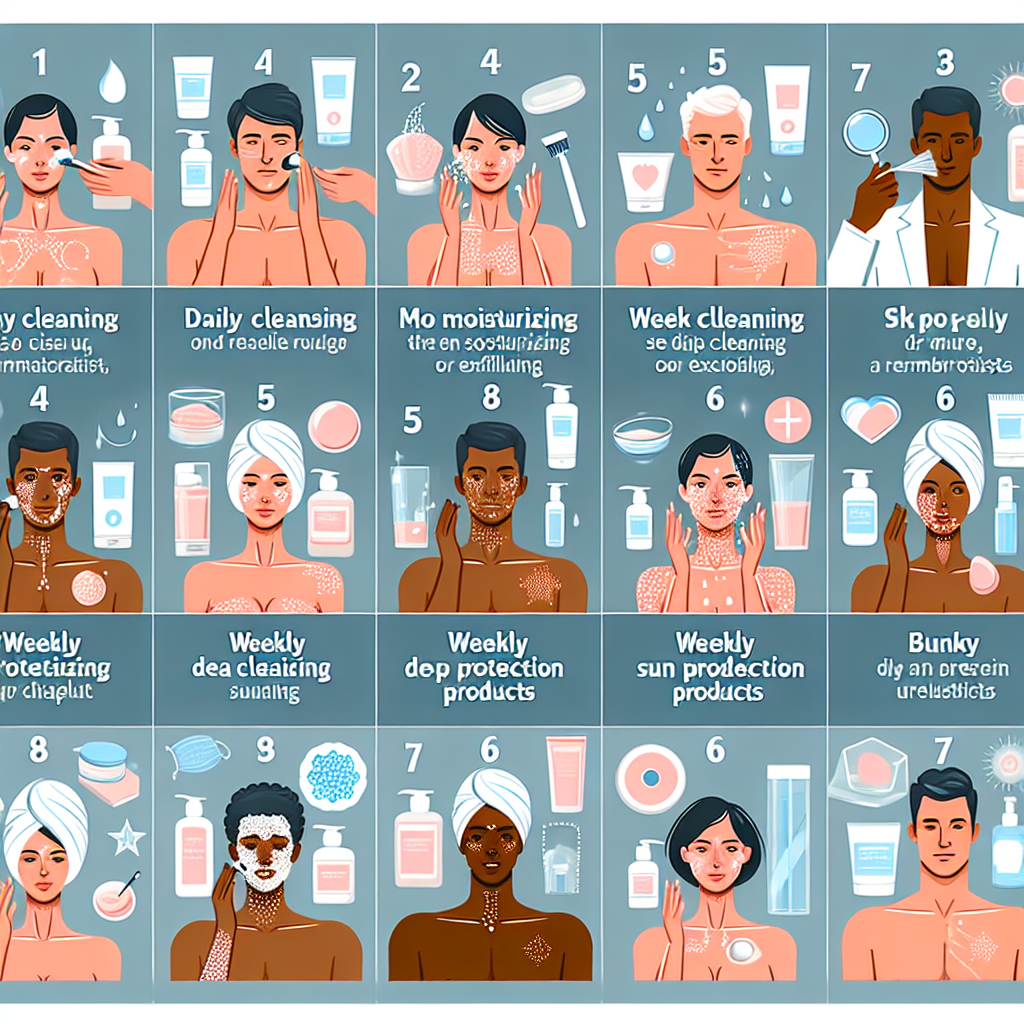The Importance of Daily Sun Protection for Healthy Skin
The Importance of Daily Sun Protection for Healthy Skin
When it comes to maintaining healthy skin, one of the most crucial steps is daily sun protection. Dermatologists around the world emphasize the significance of shielding our skin from the harmful effects of the sun’s ultraviolet (UV) rays. While the sun provides us with essential vitamin D, overexposure can lead to a range of skin problems, including premature aging, sunburns, and an increased risk of skin cancer.
UV rays are classified into two types: UVA and UVB. UVA rays penetrate deep into the skin, causing long-term damage such as wrinkles, age spots, and a loss of elasticity. On the other hand, UVB rays primarily affect the outer layer of the skin, leading to sunburns and an increased risk of skin cancer. Both types of rays are present year-round, even on cloudy days, making daily sun protection a necessity.
One of the most effective ways to protect your skin from the sun is by using sunscreen. Dermatologists recommend using a broad-spectrum sunscreen with an SPF (sun protection factor) of 30 or higher. Broad-spectrum sunscreens protect against both UVA and UVB rays, ensuring comprehensive coverage. Applying sunscreen should be a part of your daily routine, regardless of the weather or the season.
To ensure proper protection, it is essential to apply sunscreen generously and evenly to all exposed areas of the skin. Many people make the mistake of not using enough sunscreen, which significantly reduces its effectiveness. A general rule of thumb is to use about one ounce (or a shot glass full) of sunscreen for the entire body. Additionally, sunscreen should be reapplied every two hours, or more frequently if you are swimming or sweating.
In addition to sunscreen, other sun-protective measures can help safeguard your skin. Wearing protective clothing, such as long-sleeved shirts, wide-brimmed hats, and sunglasses, can provide an extra layer of defense against the sun’s harmful rays. Seeking shade during peak sun hours, typically between 10 am and 4 pm, can also minimize your exposure.
It is important to note that sun protection is not only necessary during the summer months or when you are at the beach. UV rays can penetrate through windows, so even if you are indoors, you are still at risk of sun damage. Therefore, incorporating sun protection into your daily routine is crucial for maintaining healthy skin.
Furthermore, it is essential to remember that everyone, regardless of their skin tone, needs sun protection. While individuals with fair skin are more susceptible to sunburns and skin damage, people with darker skin tones are not immune to the harmful effects of UV rays. Even if you do not burn easily, prolonged sun exposure can still lead to premature aging and an increased risk of skin cancer.
In conclusion, daily sun protection is vital for maintaining healthy skin. Dermatologists stress the importance of using sunscreen with a broad-spectrum SPF of 30 or higher, applying it generously and regularly. Additionally, wearing protective clothing, seeking shade, and avoiding peak sun hours can further enhance your skin’s defense against UV rays. Remember, sun protection should be a year-round commitment, as UV rays can penetrate through windows and affect your skin even when you are indoors. By prioritizing daily sun protection, you can safeguard your skin from the harmful effects of the sun and maintain a healthy, youthful complexion.
Essential Steps for an Effective Skincare Routine

Taking care of your skin is essential for maintaining its health and appearance. Dermatologists, experts in skin care, have shared some valuable tips that can help you establish an effective skincare routine. By following these steps, you can achieve healthy, glowing skin.
The first step in any skincare routine is cleansing. Dermatologists recommend using a gentle cleanser that is suitable for your skin type. Whether you have dry, oily, or combination skin, choosing the right cleanser is crucial. It is important to cleanse your face twice a day, in the morning and before bed, to remove dirt, oil, and impurities that can clog your pores.
After cleansing, the next step is exfoliation. Exfoliating your skin helps remove dead skin cells and unclog pores, allowing your skin to breathe. Dermatologists suggest using a gentle exfoliator once or twice a week, depending on your skin’s sensitivity. Be careful not to over-exfoliate, as this can cause irritation and damage to your skin.
Once your skin is clean and exfoliated, it is time to apply a toner. Toners help balance the pH level of your skin and remove any remaining traces of dirt or makeup. Dermatologists recommend using an alcohol-free toner to avoid drying out your skin. Apply the toner using a cotton pad and gently swipe it across your face.
After toning, it is important to moisturize your skin. Moisturizers help hydrate and nourish your skin, keeping it soft and supple. Dermatologists suggest choosing a moisturizer that suits your skin type and contains ingredients like hyaluronic acid or ceramides, which help retain moisture. Apply the moisturizer in gentle, upward motions, focusing on areas that tend to be drier, such as the cheeks and forehead.
In addition to moisturizing, dermatologists emphasize the importance of using sunscreen every day. Sunscreen protects your skin from harmful UV rays, preventing sunburn, premature aging, and even skin cancer. Choose a broad-spectrum sunscreen with an SPF of 30 or higher and apply it generously to all exposed areas of your body. Reapply every two hours, especially if you are spending time outdoors.
Another crucial step in an effective skincare routine is incorporating antioxidants. Antioxidants help protect your skin from free radicals, which can damage collagen and elastin, leading to wrinkles and sagging. Dermatologists recommend using products that contain antioxidants like vitamin C or green tea extract. These can be applied in the form of serums or creams, after cleansing and toning.
Lastly, dermatologists stress the importance of getting enough sleep and managing stress for healthy skin. Lack of sleep and high stress levels can contribute to skin problems like acne and dullness. Aim for at least seven to eight hours of quality sleep each night and find healthy ways to manage stress, such as exercise, meditation, or spending time with loved ones.
In conclusion, establishing an effective skincare routine is essential for maintaining healthy, radiant skin. Dermatologists recommend cleansing, exfoliating, toning, moisturizing, using sunscreen, incorporating antioxidants, and managing stress and sleep. By following these steps, you can achieve the skin you’ve always dreamed of. Remember, consistency is key, so make skincare a daily habit and enjoy the benefits of a glowing complexion.
Common Mistakes to Avoid in Skincare and How to Correct Them
Common Mistakes to Avoid in Skincare and How to Correct Them
Taking care of your skin is essential for maintaining its health and appearance. However, many people unknowingly make mistakes in their skincare routine that can have negative effects on their skin. In this article, we will discuss some common mistakes to avoid in skincare and provide tips on how to correct them, as recommended by dermatologists.
One common mistake is using harsh cleansers or over-cleansing the skin. While it may seem logical to use strong cleansers to remove dirt and oil, these products can strip the skin of its natural oils and disrupt its moisture barrier. This can lead to dryness, irritation, and even breakouts. Instead, dermatologists recommend using a gentle cleanser that effectively removes impurities without causing damage to the skin. Additionally, it is important to cleanse the skin no more than twice a day to avoid over-cleansing.
Another mistake people often make is skipping sunscreen or not applying enough of it. Sunscreen is crucial for protecting the skin from harmful UV rays, which can cause premature aging, sunburns, and even skin cancer. However, many people either forget to apply sunscreen or do not use enough of it to provide adequate protection. Dermatologists advise using a broad-spectrum sunscreen with an SPF of at least 30 and applying it generously to all exposed areas of the skin. It is also important to reapply sunscreen every two hours, especially when spending time outdoors.
Not moisturizing properly is another common mistake that can have detrimental effects on the skin. Many people either skip moisturizer altogether or use one that is not suitable for their skin type. Moisturizing is essential for keeping the skin hydrated and preventing dryness, flakiness, and premature aging. Dermatologists recommend choosing a moisturizer that is appropriate for your skin type and applying it immediately after cleansing while the skin is still damp. This helps to lock in moisture and keep the skin supple and healthy.
Using too many skincare products at once is a mistake that can overwhelm the skin and lead to irritation. It is important to remember that less is often more when it comes to skincare. Using a multitude of products with different active ingredients can cause the skin to become overwhelmed and react negatively. Dermatologists advise sticking to a simple skincare routine with a few key products that address your specific skin concerns. This allows the skin to adjust and respond positively to the products without becoming overwhelmed.
Lastly, neglecting to remove makeup before bed is a mistake that can have serious consequences for the skin. Leaving makeup on overnight can clog pores, leading to breakouts and dull-looking skin. It is crucial to remove all traces of makeup before going to bed to allow the skin to breathe and regenerate overnight. Dermatologists recommend using a gentle makeup remover or cleansing oil to effectively remove makeup without causing irritation.
In conclusion, avoiding common mistakes in skincare is essential for maintaining healthy and radiant skin. By using gentle cleansers, applying sunscreen correctly, moisturizing properly, simplifying your skincare routine, and removing makeup before bed, you can ensure that your skin remains in optimal condition. Following these tips recommended by dermatologists will help you achieve the best results and keep your skin looking its best.




